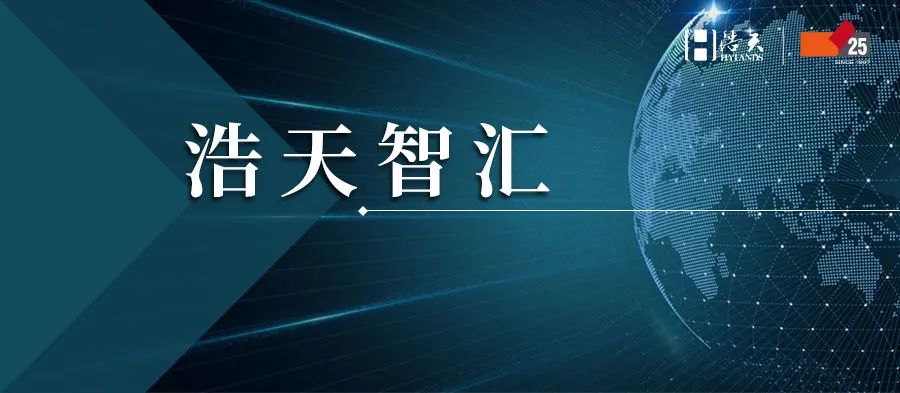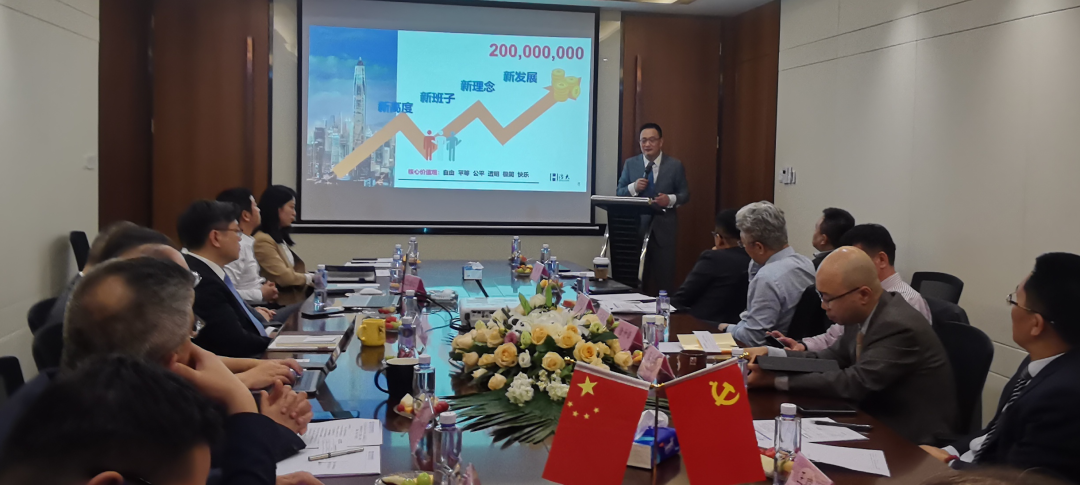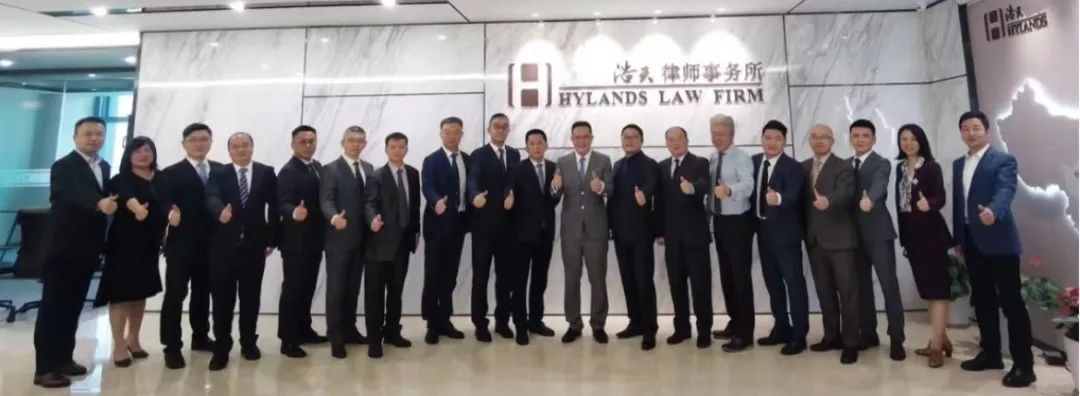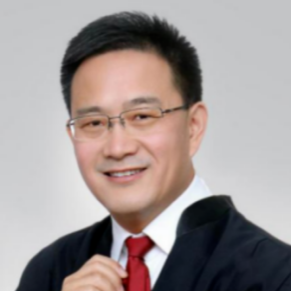Building a Client-Centric Law Firm

The following extract is from the speech delivered by lawyer Qi JIANG at Hylands Law Firm’s Shenzhen office General Election Work Conference on April 21.
✦
✦
Dear partners of Hylands’ Shenzhen office:
Good afternoon, everyone!
I am very grateful to Hong LIU, the director of the head office for the invitation and the trust of all partners, which gave me the opportunity to run for the position of director of Hylands’ Shenzhen office. As a usual practice, I will describe the blueprint for the future development of the firm and explain to you what kind of law firm we are going to build. I hope that in the next three years, I will work with all partners and lawyers to build a client-centric law firm. This is a whole new concept. China's renowned enterprise - Huawei, adheres to the core value of being ‘customer-centric’ and builds its management systems and cultural systems around this value. I put forward this development concept based on my observation of the Chinese legal industry and my work experience over many years.
In the past, lawyers were the center of law firms, which meant that lawyers had client resources, business resources, and team resources. They could work from home, from coffee shops, or from their offices. Many lawyers jointly form a partnership law firm. This kind of lawyer-centered law firm still exists nowadays. Later, there emerged a law firm that centered on the law firm itself, and they operated with a corporate structure and implement centralized management of clients, business, resources, and management. Many large-scale law firms also implemented a management-centric operating model. This kind of organization-centered law firm is common in China's legal circles today.
In the future, I think client-centric law firms will dominate. What do we mean by customer-centric? It means that the human, finance, property, management, and culture of a law firm must be arranged to meet the needs of clients. Human refers to partners, lawyers, public support staff, etc. Finance includes two parts: 1. cash flow, including entry fees paid by partners. Larger law firms hold large amounts of this, 2. undrawn cash flow, which is often in huge amounts. The cash flow of law firms should be used for the purpose of better serving clients. The property includes tangible assets and intangible assets, of which brand is the core, accounting for 30%, knowledge management accounts for 30%, and the rest are real estate, vehicles, fixed assets, etc. Law firms are asset-light enterprises, 60% of their assets are intangible assets. In addition, information work, management, and cultural construction of the firm should also be adjusted around customers’ needs. This is the image of the future of the law firm in my mind. How to explain the difference between these three law firms? The image there are five teacups placed around a teapot, for a lawyer-centered law firm, the teapot is the lawyer; for an organization-centered law firm, the teapot is the law firm; for a client-centered law firm, the teapot is the client.
Based upon my observation and practical experiences, I believe that we should build a client-centric law firm from four aspects: first, realize client classification; second, understand client needs; third, improve client experience; fourth, solve client problems.

一
Realize customer classification
I think customers can be classified according to three criteria. The first criterion is according to customer status, whether they are an ex-customer, existing customer, or target customer. Regarding ex-customers, we want to analyze how many customers we lost in the past year. Why are they lost? Existing customers refer to customers that exist in the filed cases, to which we should pay much attention. Target customers are potential customers. The second criterion is based on industry. Try to figure out how many customers the Shenzhen office has in the fields of finance, real estate, international trade, asset management, and individual citizens. Then further divide them into agriculture, forestry, animal husbandry, sideline fishery, etc. We must classify all our customers comprehensively and obtain accurate information about them. The third criterion is based on the number of charges. How many customers pay more than 10 million service fees? How many customers pay more than 5 million service fees? How many customers pay more than 1 million service fees? Why segment customers? We do this to better integrate resources, improve service quality, gain new customers, avoid losing existing customers, and increase profit for each of our partners.
If I am elected, I will immediately set up a customer service center to gradually improve services for existing customers from the two aspects of professional redevelopment and regional redevelopment. I hope that in the future Hylands’ Shenzhen office will discuss researching customers, analyzing customers, and expanding customers. We must also pay attention to party-building work, and at the same time pay attention to customer analysis and research. The point of the customer analysis is: How many clients does each attorney have? What types of cases are the 1000 filed cases in 2021? Can we provide value-added services to clients? Whether it is possible to expand the service scope for existing customers? That is, whether it is possible to carry out professional redevelopment? Regarding regional redevelopment, assuming the client has a branch in Hunan, can we certainly recommend the client to Hylands’ Changsha Branch? We should put all our attention on customer redevelopment and business redevelopment. I hope we have more customer research sessions in the future. We also need to set up a market development and bidding center to continuously improve bidding work and increase the bid winning rate. The construction of these two centers is in progress. As I mentioned in my speech on ‘Strong Middle Office, Integrated Development’, bidding and customer service are the two key points in the construction of the middle office. Hope the Shenzhen office follows the example of the head office and began to improve customer research, classification, and development work.
二
Grasp the needs of the customer
Accurately grasping client needs is the prerequisite for providing clients with high-quality legal services. How to understand customer needs? The key is to strengthen communication, think from the perspective of clients, and use independent judgment.
We must strengthen our communication with customers, whether it is through visits, meetings, online communication, or communication outside of working hours. Only through communication, we can know what our customers are thinking. What are they doing? Face-to-face communication is much more effective than online communication. By reading the body language of customers, especially though eye contact with them, we can better understand the true thoughts of customers, so as to provide them with the services they really needed. Clients usually have an incomplete understanding of legal issues, so we not only need to understand clients' ‘explicit needs’, but also their ‘implicit needs’. Ford once asked one of his clients "what do you need?" and the client said, "I need a horse". The reason why Ford became a well-known company is because of his next question-"What kind of horse do you need?", the customer said "I need a fast horse", "Why do you need a fast horse?" "I need to arrive as soon as possible to my destination". In the end, Ford gave the customer a car. Only when you communicate with customers you can know what their real needs are.
The second is about putting yourself into the shoes of clients. We must always consider issues from the perspective of customers in order to understand what services they need and understand their expectations and concerns. If you can't grasp the real needs of your clients, you will never become a top lawyer. At this stage, the biggest concern of customers in the financial industry is compliance; the biggest concern of clients in the asset management industry is the disposal of underlying assets; the biggest concern of clients in the real estate industry is asset restructuring, and the biggest concern of clients in the foreign trade industry is default handling. At present, due to the sharp fluctuations in global commodity prices, the impact of wars, and the pandemic, the cost of a breach of contract is lower than the cost of compliance, so many companies have chosen to default to avoid further losses. Therefore, lawyers need to help clients solve their biggest concerns in order to provide the legal services that clients need the most.
The third is independent judgment. In my book ‘Follow the Trend’, I pointed out that it is right to follow the trend, but at the same time, we also need to think independently. Learning without thinking will lead to failure, and thinking without learning will lead to peril. We have to think for ourselves before we know what our direction is. Therefore, we must always grasp the needs of customers. Why do we say "grasp" the needs of customers, but not "understand" the needs of customers? Because "grasp" means a comprehensive understanding of client needs, and only through this you can provide clients with better legal services.
三
Improve customer experience
If I am elected as the director, I will hold many client research meetings, client communication meetings, client appreciation meetings, and client exchange meetings in Hylands; Shenzhen office, and take these four meetings as the center and focus of all the work of the law firm. I think the law firm needs to strengthen academic research, so as to further improve the quality of legal services. The Shenzhen office will move to the 102nd floor of Ping An International Finance Center - the tallest building in South China on May 9, 2022. I plan to hold these four meetings within two months. The theme of the client research meeting is the disposal of underlying assets in the asset management industry. We plan to hold this seminar jointly with the Shenzhen Private Equity Fund Chamber of Commerce. The theme of the second seminar is the frontier issues of bankruptcy reorganization, and we plan to hold this meeting with the Bankruptcy Law Research Institute of the City Law Society. The theme of the third seminar is the disposal method of financial non-performing debts. In this seminar, we will discuss whether we can have a more cutting-edge perspective on the disposal of special assets. We will also discuss overseas recovery, criminal law recovery, and the protection of financial creditors in the process of bankruptcy, and reorganization. The theme of the fourth seminar is the frontier legal issues of the intellectual property business. We plan to jointly hold this seminar with the School of Intellectual Property of Shenzhen University. The purpose of the seminar is to provide customers with value-added services, enhance the trust of the customer in the firm, increase customer loyalty to the firm, and get closer to customers. Through 25 years of legal practice, I have summarized the following principles for serving customers:
The first one is to be persistent. The key to success lies in persistence. Only by anchoring the goal and moving forward step by step, we can get things done.
Second, the price should be fair. Price is a key factor in sealing a deal. We should charge reasonably according to fee standards and reject vicious competition. No matter how the environment changes, the lawyer's fee should be consistent with the service provided. Overcharging constitutes fraud, but undercharging is not good for building customer trust.
The third is to think before the clients start to think. Whether it is in terms of resource allocation or legal arrangement, we must think before the clients start to think, which is why clients hire lawyers. We must not only put ourselves on the shores of our clients, but also think before the clients start to think, actively discover problems before clients discover problems, guide customer needs, and solve customer concerns in all possible ways.
The fourth is about quick response. Lawyers should take the needs of clients seriously. They should continuously improve work efficiency to respond to their needs as soon as possible.
The fifth is to maintain sincerity. Treat customers like a family. Clients are smart and have many attorneys to choose from. Therefore, when serving a customer, we should adhere to the principle of good faith, treat every customer sincerely, do our best to serve every customer, and gradually build a sense of trust with customers.
Sixth, if you are not in the client's office, you should be on the way to the client's office. Many lawyers asked me, why I have so many clients. I say it is because I keep writing books, writing articles, and delivering speeches. I combine knowledge marketing with team marketing to promote market awareness, and always practice the concept of being customer-centric.
I hope Hylands can break down the barriers between lawyers and clients, form a unified client base, and create greater value for clients. After moving into Ping An International Finance Center, the most high-quality office building in South China, I hope we can hold different high-quality client research meetings, client appreciation meetings, communication meetings, and exchange meetings there, so as to continuously expand our customer resources.
In addition, we need to improve service awareness, constantly research customers, meet customer needs, and provide customers with a good service experience, so as to improve customer satisfaction with our services, and provide customers with products and services that exceed their expectations. By improving customer experience, we can gain a more competitive advantage.
四
Solve customer’s concerns
A lawyer who cannot solve a client's problem is not a good lawyer. There are some non-litigation lawyers who write hundreds of pages of legal opinions for their clients, without a conclusion. They just point out risks for clients but offer no solutions. There are litigators who can write fancy bids but lose the lawsuits, but we know that the only thing our clients want is to win. Regarding how to solve customer problems, I think we need to work from three aspects.
The first aspect is to unremittingly develop high-quality products and provide high-quality services to clients.
The second aspect is to eliminate lawyers with poor execution ability and look for wolf-like lawyers. I don't trust the professional level, professional resources, and judicial resources of some lawyers, so I cannot recommend them to my clients. We must eliminate our teammates with poor execution ability, because they will not be beneficial for the development of the law firm, but will also greatly reduce the quality of legal services of the firm. We should help teammates with poor execution ability to grow into wolf-like lawyers, because wolves are always running, aggressive, and team-spirited. Lawyers with poor execution ability will gradually be eliminated by the market and by law firms. This is obviously not what we expect to see. We must learn from Huawei and implant the genes of the ‘wolf culture’ into the firm’s culture. We want to work with wolf-like teammates, keep running, and move forward at full speed.
The third aspect is to fulfill the promise to customers and satisfy their needs of customers. What is the client's purpose in hiring a lawyer? They hire us to win litigation and avoid risks, which is our ultimate goal of providing legal services. A lawyer who cannot solve problems is not a good lawyer. We must fulfill our commitment to clients, spare no efforts to help them solve problems, and strive to provide services that exceed clients’ expectations.

Epilogue
2022 marks the completion of the transformation of Hylands’ Shenzhen office, and today's election will open a new stage of Shenzhen office development. In this office located on the 102nd floor of Ping An International Finance Center, we should uphold the concept of ‘co-ownership, co-construction, co-governance, and sharing’ and promote the development of the firm by adhering to the core values of ‘freedom, equality, fairness, transparency, simplicity, and happiness’. Under the new leadership, we should work as a team to promote the overall development of the firm. Let us build a client-centric law firm, double the quality of clients, and achieve the small goal of generating 200 million in profits in three years. The above is my campaign speech. I hope that everyone can support me. I am confident that together with you, I will make Hylands’ Shenzhen office a model for Hylands’ other national offices and make it an ideal law firm in China!
Qi JIANG
Banking and Finance | WTO/International Trade | Dispute Resolution and Litigation
Attorney Qi JIANG, chairman of the board of directors and managing partner of Hylands Law Firm, director of Hylands’ Shenzhen office. Attorney Jiang graduated from the University of International Business and Economics with a doctorate in international law. In the past 25 years, Mr. Jiang has handled more than 2000 cases of various types, involving more than 100 billion yuan. Attorney Jiang is good at handling highly professional financial, international trade, and corporate non-litigation legal affairs. He has represented clients in handling major, difficult, and complicated litigation cases before the Supreme Court, the Supreme People's Procuratorate, CIETAC, and provincial high courts. Attorney Jiang serves as the vice chairman of the Commercial Law and Practice Committee of the International Chamber of Commerce China National Committee (ICC CHINA), an expert on the Letter of Guarantee Group of the Banking Professional Committee, and a corporate compliance expert of the Shenzhen Council for the Promotion of International Trade. In 2020, he was ranked in the ‘The A-List Legal Elite 100 List’ by China Business Law Journal, and in 2022, he was listed in Chambers Global 2022 and Chambers Greater China Legal Guide (Greater China Region Guide). Attorney Jiang has written the following books: Goods Legal Risks and Precautions of Prevention in International Trade, Goods Fraud and Anti-Fraud Cases in International Trade, China's Independent Letter of Guarantee Practice Essentials and Cases, and The Latest Commercial Bank Dispute Resolution Topic Interpretation and Practice Guidelines, Incoterms 2020 (translation), Incoterms 2020: an In-depth Interpretation (participant editor), and the Following the Trend-Jiang’s Opinions on Virtue and Balance.






